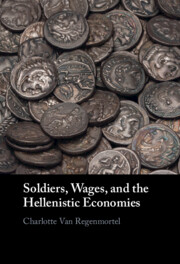Book contents
- Soldiers, Wages, and the Hellenistic Economies
- Soldiers, Wages, and the Hellenistic Economies
- Copyright page
- Dedication
- Contents
- List of Tables
- Acknowledgements
- Note on Transliteration and Translation
- Chronology
- Abbreviations
- List of Maps
- Maps
- Introduction
- Chapter 1 Contextualizing Paid Military Service
- Chapter 2 The Concept of Wage Labour
- Chapter 3 Enlistment and Terms of Service
- Chapter 4 Forms of Remuneration and Standards of Living
- Chapter 5 The Military Labour Market
- Chapter 6 Military Wage Labour and the Hellenistic Economies
- Conclusion
- Epigraphic Dossier
- Bibliography
- Index
Chapter 4 - Forms of Remuneration and Standards of Living
Published online by Cambridge University Press: 21 May 2024
- Soldiers, Wages, and the Hellenistic Economies
- Soldiers, Wages, and the Hellenistic Economies
- Copyright page
- Dedication
- Contents
- List of Tables
- Acknowledgements
- Note on Transliteration and Translation
- Chronology
- Abbreviations
- List of Maps
- Maps
- Introduction
- Chapter 1 Contextualizing Paid Military Service
- Chapter 2 The Concept of Wage Labour
- Chapter 3 Enlistment and Terms of Service
- Chapter 4 Forms of Remuneration and Standards of Living
- Chapter 5 The Military Labour Market
- Chapter 6 Military Wage Labour and the Hellenistic Economies
- Conclusion
- Epigraphic Dossier
- Bibliography
- Index
Summary
Hired soldiers had to be incentivized to enlist, and subsequently induced to continue their service. Hence, together with the growing reliance on paid, voluntary tropps, we see the development of increasingly sophisticated systems of remuneration, comprising rewards in both coin and kind. Enlistment across all ranks of the royal armies was incentivized and, indeed, made possible via the provision of armour and equipment, or via grants of land to those recruited into elite divisions. Coined payments going beyond mere rations, as well as occasional bonuses, formed the bulk of the remuneration attested in both the textual and numismatic record. Additional benefits and privileges – such as the occasional right to plunder, tax breaks, legal protections, and family support – were also sometimes granted. Together, these incentives seem to have offered soldiers of the royal armies an above-average standard of living, as indicated by the qualitative and (sparse) quantitative evidence.
- Type
- Chapter
- Information
- Soldiers, Wages, and the Hellenistic Economies , pp. 101 - 142Publisher: Cambridge University PressPrint publication year: 2024

